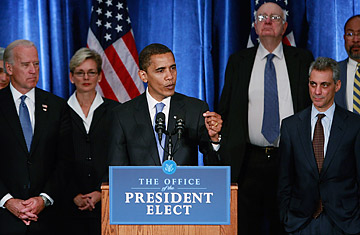
Barack Obama is flanked by Joe Biden, left; Rahm Emanuel, right; and members of his transition economic advisory board
This one was almost seamless.
The mostly error-free nature of the 75-day transition period between the November election and today's Inauguration was all the more remarkable because Barack Obama was elected at a moment of grave national crisis and deepening economic misery. He moved early to step into the picture, despite the presence of a sitting President, and, day by day, took control of the national debate. By last weekend, most of the stories about the nation's next steps at home and overseas turned completely on Obama's latest remarks and inflections. Some commentators were already routinely referring to him as the President. (See pictures of Obama's nation of hope.)
The transition wasn't quite perfect. But from a political perspective, Obama took three significant steps to make his entry into the Oval Office as smooth as possible — and to extend the customary honeymoon period granted to new Commanders in Chief by a considerable length.
Co-Opting the Republicans
Obama's shrewdest move, though little noticed at the time, came two weeks ago, when he broadened his long-promised package of tax cuts for individuals to include a larger array of deductions for businesses. These proposed tax cuts and credits take the form of accelerated depreciation schedules for certain investments and complex prior-year tax rollbacks. The surprise proposals set the stage for what is likely to be a bipartisan passage of the stimulus package. The sheer volume of these cuts — numbering in the hundreds of billions — makes it very difficult for Republicans to oppose the stimulus measure. If anything, the proposals generated protest from Obama's left flank. (Indeed, to satisfy his base, Obama has eased back slightly from a few of the business tax cuts.)
"The tax-cuts cross pressured all of the GOP groups," said a top Republican lobbyist who described Obama's transition as "brilliant." "How do groups like the U.S. Chamber of Commerce or the National Association of Manufacturers come out against them? He very quickly picked off all the important interest groups and locked in a lot of votes with those proposals."
Putting the Democrats on Notice
Democrats on Capitol Hill played Obama's unexpectedly generous business-oriented tax cuts to their advantage by swiftly demanding greater spending for their priorities. Whatever concessions Obama made in response — there were frantic closed-door meetings to calm the Democrats down — he was probably going to have to swallow in the form of more spending anyway. Meanwhile, he indicated that he was not inclined to permit Democrats in Congress to look for ways to prosecute outgoing Bush officials over their conduct on the war or their authorization of torture. And Obama, in contrast to House Speaker Nancy Pelosi, is content to let the Bush tax cuts of 2001 expire in 2010 rather than repeal them. That is not a fight he needs now, even if it makes good economic sense to roll them back.
Touching All the Bases
In the two weeks that Obama lived in Washington as President-elect, he efficiently paid homage to the capital's various power centers. He did an interview at the Washington Post. He dined with leading conservative thinkers at George Will's suburban Maryland home. He rubbed elbows with his former colleagues on Capitol Hill, grabbed a bite at Ben's Chili Bowl and took a late-night tour of the Lincoln Memorial. He also paid quiet visits to both Arlington National Cemetery and Walter Reed Army Medical Center.
Obama was helped in his transition by a notably cooperative White House. The outgoing Bush team not only worked before the election to make way for the new team at key agencies but held countless orientation sessions for their Democratic counterparts across the government.
Were there speed bumps along the way? Well, the vetting of Secretary of Commerce nominee Bill Richardson — withdrawn after it was revealed that he's part of a federal pay-or-play probe — was hardly a model, and Timothy Geithner's tax problems while at the International Monetary Fund will slow down Geithner's move to Treasury, though probably not for very long. The unexpected indictment of Illinois Governor Rod Blagojevich and the circus that followed introduced a minefield that wasn't on anyone's transition road map, while the choice of Rick Warren to lead an Inaugural prayer generated unanticipated heat from Obama's base.
But those mostly minor snafus will quickly be forgotten. As transitions go, Obama has set a new standard for smooth. And apart from the tricky business of replacing one Administration with another, this transition succeeded at something equally as meaningful. It transformed the nation's mood from grim to just a little optimistic.
